Cultural competence is one of those things every company claims they practice, when actually very few do. Every career page says something like it: “We are an equal opportunity employer,” or “We value diversity.” (Well, now it looks more like “We value Inclusion.”) Cool to see. But culture doesn’t come from a slogan. Cultural competence takes daily work of noticing differences, adapting how we communicate, and building enough trust that people can speak up; even when it’s a messy or unpopular subject. That’s the difference between teams that look diverse or inclusive on paper and a team that actually works well together.
Cultural Competence Today
Hybrid calendars. Global teams. Four different generations on one call. Politics bleeding into work. The risk is more than disagreement and people shutting down, the team won’t feel safe enough to even engage. When psychological safety is present, teams get through problems faster and just work better. Leadership behaviors like outlining work as learning and inviting input directly raise that safety level.
Meanwhile, engagement took a hit recently. Only 31% of U.S. employees say they were ‘engaged’ in 2024… that’s a 10-year low. So every small behavior that rebuilds connection really counts.
What We Mean by “Cultural Competence”
Simply put: understand differences, and adjust behavior. It’s listening across accents and styles. Stopping assumptions before they spread. It’s choosing inclusive language, not words that exclude. And it pops up in everyday moments, like who gets airtime, who gets credit, who handles the follow-up. Some of those differences are easy to see; others, like invisible disabilities, are not, but they still shape how people experience the exact same workplace.
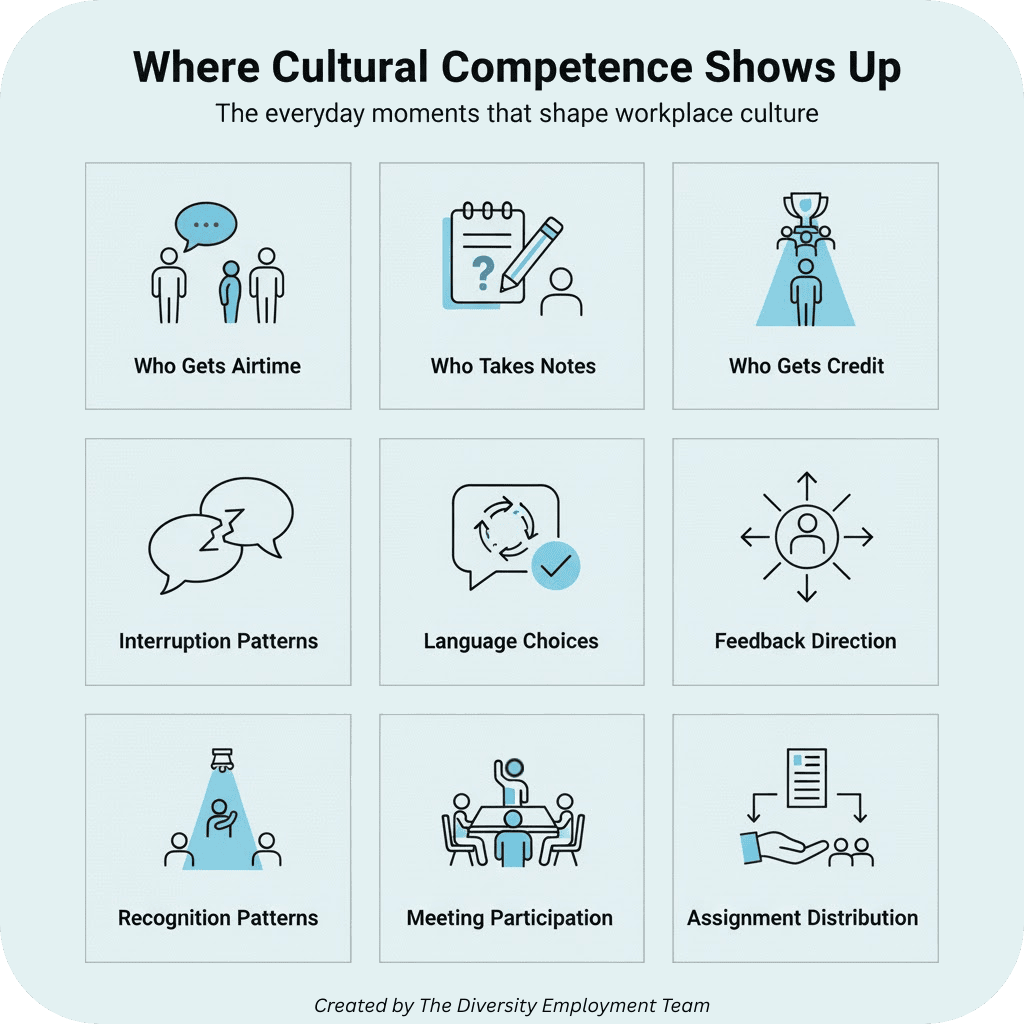
The Business Case Without Buzzwords
Strong, inclusive cultures hang on to people. SHRM’s 2025 findings say workers in positive cultures are nearly 4x more likely to stay than those in poor cultures. That’s not just feel-good… It’s cost control and momentum.
Add in the trust factor, middle managers report the lowest psychological safety of all levels right now, which drags teams down with them. Fixing safety at that level improves execution up and down the organization.
Where We’re Headed in This Guide
This is not a compliance lecture. We’ll make this practical: what real cultural competence looks like, how leaders can build it without another giant three ring binder, what anyone can do (even without a title), and how to keep that progress from stalling.
How Cultural Competence is Different from DEI Training
Every few months, another company rolls out “DEI refresh training.” The two-hour meeting with slide decks, breakout rooms, lots of polite nodding. Then… nothing changes.
Cultural competence isn’t something you can just workshop. It’s a skill. It happens when people learn to adapt to differences instead of tiptoe around them.
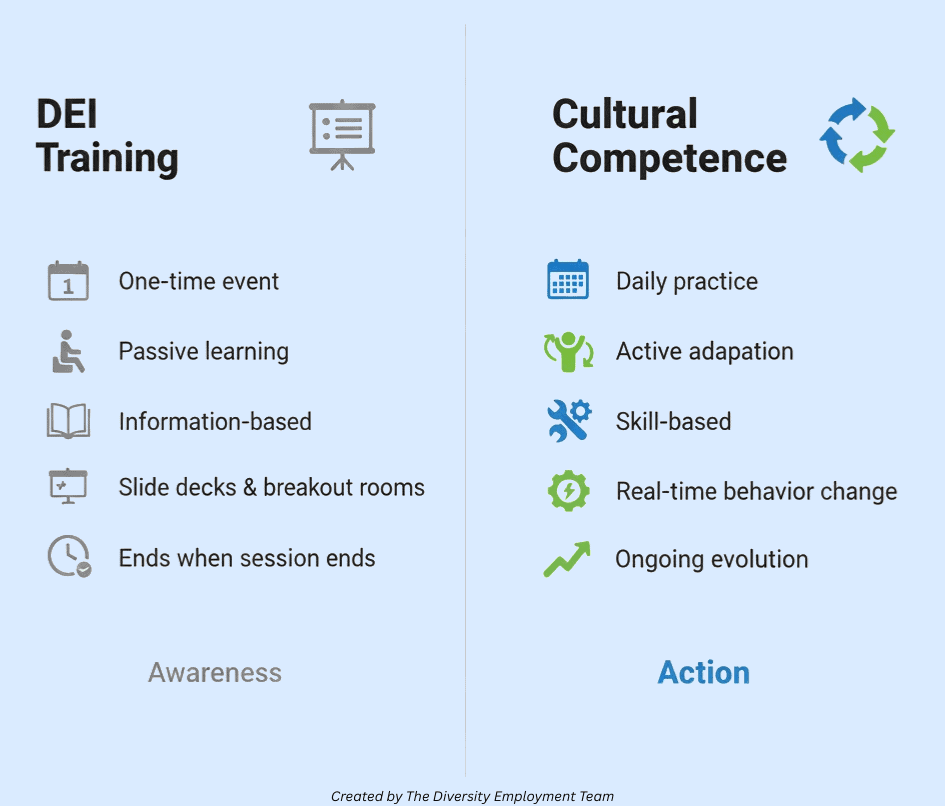
Awareness Turns into Adaptation
You start by noticing differences in the team: who talks the most, who hesitates with their ideas, whose ideas work easily and whose seem to vanish or fall short mid-meeting.
Then comes the real work: adapting to each one. That might mean slowing down your pace for a teammate whose first language isn’t English. Or letting someone think out loud before jumping in with your point. They can seem like small moves, but they shift the whole tone of a team.
It’s Not in a Slide Deck
Most diversity or inclusion training is just information. You sit, listen, and nod.
Competence is the part that happens after. It’s when you catch a bias in real time and adjust, or when you realize a “joke” you used to make isn’t as harmless as you thought, and you stop making it.
Training can teach you the terms. Competence teaches you timing, tone, and empathy.
Daily Habits, Over One-Time Events
Culture doesn’t come from fancy annual retreats. It’s built in the everyday-moments:
how feedback is taken, who gets interrupted, who’s looped in or left out.
Cultural competence is exactly that. Those little choices may seem invisible… Until you start looking for them.
And once you do start noticing the little things, you can’t unsee them… And that’s the point.
Keep Evolving to Keep Up
The real kind of cultural competence, that people can feel at work, works even when nobody is paying attention. One week something sounds fine, and then suddenly it feels a little off, and no one can even point to the moment it changed. It just does.
So leaders cannot step away and expect everything to keep its shape. They have to keep checking in. Sometimes it is a tiny fix. Sometimes they realize the whole tone drifted and they did not catch it until later.
You pay attention to one person, then whoever comes next, and then whatever changed after that. Not perfect. Just present enough so things do not slide into a place nobody wants.
Why It Matters Right Now
The workplace isn’t what it was ten years ago. We have hybrid schedules, global teams, cultural collision courses, etc. They’ve all become part of the daily rhythm. And with that, the cost of not being culturally competent just keeps rising.
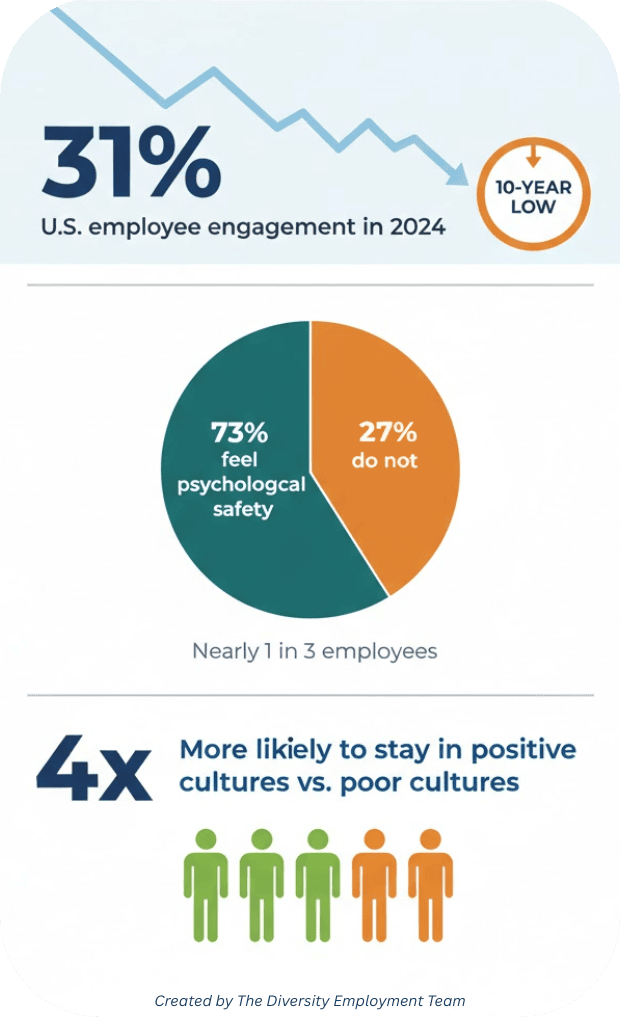
The Performance Risk is Real
Companies that prioritize ethnic diversity are about 39% more likely to financially outperform others.
That isn’t one of those “nice-to-have” stat; it’s a “why are we still ignoring this” siren.
Psychological Safety is the Bridge Between Culture and Performance
A recent benchmark found that 73% of employees feel positive about psychological safety. That number sounds pretty good… Until you realize that it means nearly one in three employees do not.
In teams where people don’t feel seen or safe, work can hit a wall, disengagement becomes the norm, and the company’s retention rate can drop. Building cultural competence is the scaffolding under that safety.
Diversity Without Competence Creates Dissonance
76% of white workers believe their company values inclusion… But only 65% of ethnic minority workers agree. That gap? It’s a sign. Having diversity is one thing. Making it inclusive and work together is another thing. Cultural competence closes the gap.
Retention and Brand Matter More in Today’s Market
Over 60% of employees say they definitely prioritize inclusive cultures when deciding where to apply to.
So, if your cultural competence doesn’t show up for real, the talent door can swing both ways.
Bottom Line
All the numbers you just read come back to one thing: how people treat each other when no one’s watching.
That’s real cultural competence. Not the policy, not the statement, but the everyday behavior that decides whether people join in or shut down. You simply can’t spreadsheet your way into inclusion.
So stepping out of theory and into reality; let’s get into what cultural competence actually looks like when it’s actually working for a team.
When Cultural Competence Works
You see it in the everyday things. The way people speak to each other. The way a rough moment gets handled without blowing up. Or the way someone brings up something uncomfortable and the room actually pauses instead of shutting down. It all counts, and here’s how it really shines.
People Listen to Understand, Not to Reload
You can tell how healthy a team is by how they handle silence. Some rush to fill it. Others give it space.
Culturally competent people understand that active listening isn’t just waiting for your turn to speak. Good teammates will let the other person finish their entire thought, even if/when they already have their rebuttal ready.
They pause before responding and ask follow-up questions; to show they were paying attention and/or to get any missing pieces.
That small act of slowing down can turn a potential argument into a moment of clarity.
And it spreads. When people feel heard, they start returning the favor and communication finally feels more like collaboration, not competition.
Feedback Travels in Every Direction
In a lot of workplaces, feedback moves one way… Downhill.
It’s usually wrapped in performance reviews or “development conversations,” which everyone secretly dreads.
Competent teams change that dynamic completely.
They make feedback a conversation, not a verdict.
A manager might ask after a meeting, “How did that come across?”
And an intern can speak up by saying something like, “Hey, that wording didn’t feel right to me. Can I tell you why?”
When issues are handled in the moment like that, neither person will feel defensive or backed into a corner… Because the only point is understanding.
And when other employees see that kind of understanding in action without anyone blowing up, they start to believe they can do it too. Now trust becomes cultural, not conditional.
Bias Gets Noticed Before It Becomes Policy
Bias doesn’t start in the boardroom, it starts with little habits.
Who gets the “stretch” assignments? Who’s asked to take notes? Who’s always called “detail-oriented” while someone else gets called “strategic?”
In competent workplaces, people notice those patterns before they set.
They ask questions like, “Why is it always Maria handling the admin work?” or “Have we heard from the people actually affected by this policy?”
It’s all about catching the patterns. And when leadership responds with curiosity instead of defensiveness, that’s when a company starts maturing past awareness into action.
Communication Flexes Instead of Fractures
Walk into any hybrid meeting and you’ll see a dozen different communication styles in the wild.
One person is direct to the point of bluntness. Another couches everything in soft phrasing. Someone else barely speaks but types paragraphs in chat after the call.
In culturally competent teams, no one demands conformity.
They adapt to accents, pacing, time zones, and comfort levels.
If something’s unclear, they clarify instead of criticize.
They’ve learned that connection doesn’t come from everyone speaking the same way. Connection comes from everyone being heard their own way. A lot of that depends on everyday power skills that people rarely get formal credit for.
Leadership Models It Out Loud
Leadership sets the overall emotional tone… whether they want/mean to or not.
Culturally competent leaders admit when they don’t know something; and they ask questions before they assume. Plus, they actually thank people who challenge them.
A Vice President saying, “I hadn’t considered that, thank you for that out to me!” can shift the entire atmosphere of a room; suddenly, the whole team feels like it’s safe to speak up.
That’s the kind of vulnerability that shows cultural competence in real-time.
Mistakes Turn into Lessons
Frankly, people are going to get things wrong. Someone is going to slip up, say a name wrong, use a phrase that aged badly, or make a comment that just hits wrong, for whatever reason. It just happens. What really matters though, is what happens next.
Some teams freeze and hope it blows over. Then they go back to the same ‘ol, same ‘ol.
In the other ones, the team talks it through for a minute, nothing dramatic, just a simple “Hey, I know you didn’t mean it that way, but here’s how it came across.”
99% of the time it’ll be fixed right then and there. The person simply apologizes, corrects the problem, and the whole team moves forward without any resentment or future issues.
The goal, again, isn’t perfection. It’s focused on real-time recovery.
Fixing these issues in public shows the whole team how to handle mistakes with humility; and that’s how trust gets built. One moment at a time.
Recognition Reflects Reality
Every culture has its “loud voices.” The ones who get more airtime, praise often, and promotions. Cultural competence widens that spotlight to the quiet folks too.
When recognition includes the more quiet contributors like the organizers, the translators, or the behind-the-scenes problem solvers, everyone sees that value isn’t just measured by loudness.
It changes who feels motivated to show up fully, and who feels invisible. And when everyone’s effort is visible, morale goes way up overall. Simply because, fairness just feels good.
Inclusion Becomes Automatic
You’ll know a team has reached this point when inclusion stops needing a label.
It’s not scheduled or formalized; it just happens.
No one has to remind others to make space in meetings, or to pronounce a name correctly, or to ask for input from someone who’s quiet. They already do it.
The culture becomes self-sustaining, a reflex instead of a requirement. That’s the goal. Not metrics. Just people who care enough to keep trying.
How to Build-In Cultural Competence
Here’s the thing again, you can’t just train your way into cultural competence.
You can teach people the terms, sure. You can define “microaggressions” and talk about empathy until the projector burns out. But cultural competence, real, daily, active competence, comes from what your workplace rewards, tolerates, and models every single day. Start there.
Hire for Curiosity, Not Just Experience
You can teach skills. You can’t teach curiosity.
When you’re hiring, look for people who ask thoughtful questions, who admit what they don’t know, who use phrases like “I’d love to learn more about that.”
Those people keep teams flexible.
Curious minds build bridges faster than experts with closed ones.
And when curiosity becomes part of your hiring DNA, the culture naturally starts learning instead of defending.
Reward Inclusion the Same as Reward Output
If the only people getting raises are the ones hitting numbers, you’re quietly teaching everyone that empathy doesn’t pay off.
Start recognizing the invisible labor that keeps teams functioning like the mentoring, mediating, including, translating.
When people see inclusion rewarded, it stops being a side project and starts being the standard. Recognition shapes behavior faster than any training ever will.
Make Space for Honest Conversations
Psychological safety doesn’t come from slogans, it comes from proof.
Create forums where employees can talk openly about what’s working and what’s not.
Then, and this part’s crucial: act on what you hear.
Anonymous surveys are fine, but public follow-through builds trust much faster. People notice when leadership listens; and they really remember when it doesn’t.
Let Stories Lead (Not Policies)
Facts make you think. Stories make you care. Start meetings with small wins, personal lessons, or short reflections from team members about moments of inclusion (or exclusion) that stuck with them. It keeps empathy fresh and real, not theoretical.
Stories remind everyone why this matters, and they stick around a lot longer than the policy memos that just get forgotten.
Give Managers Tools, Not Scripts
Managers are the culture keepers. They handle all the hard stuff: conflicts, confusion or miscommunication, and many other little things people don’t see.
They need the tools to help spot conscious or unconscious bias, hold fair conversations, and actually de-escalate tension. They sure don’t need a three- to five-liner they have to recite to everyone. A one-size-fits-all script sure won’t help when someone’s crying or shutting down from burnout.
Teach management to stay calm, keep a curiosity for all team-members, and stay consistent. That’s cultural competence in motion.
Pair Accountability with Grace
Accountability without some compassion becomes punishment. Grace without accountability becomes chaos. Competent workplaces know how to do both.
When someone inevitably messes up, go straight to repairing the situation and learning from it, not shame or exile them.
When someone’s constantly careless, the goal here should be correction before you end up in an endless loop of excuses.
If management can handle both with fairness people will trust you enough to tell the truth every time.
Make Learning the Culture, Not an Event
You know that saying, “Culture eats strategy for breakfast”? (I hadn’t heard the phrase before either, but I promise it is a thing.) Well, either way, learning eats culture for lunch! Workplaces with high cultural competence tend to put team growth over output. Because growth and learning benefit your teams and the organization. More skilled employees leads to better work all around. And when management encourages continuous learning, teams aren’t afraid to reach higher.
Swap out the one annual training day for a couple, monthly, five-minute learning sessions.
Share short articles, talk about real-life stories, invite guests to speak, too. Keep learning alive… instead of buried in a slide deck that no one will ever see more than once.
Always Lead by Example
At the end of the day, every employee watches what leaders really do much more than what they say.
If you interrupt someone or misspeak, own up to it… out loud. Again, employees are always watching. So, if you don’t know how to deal with a specific situation or topic just say it. Then, learn it.
Nothing makes a workplace more culturally competent than a leadership who’s actually practicing the things they are preaching.
The Hand-Off
Cultural competence doesn’t hide in a few short lines in dusty HR binders; or yearly CEO speeches. Most of it is in whatever people do in-the-moment, the little choices they make without thinking too hard about it.
Leaders can hand out all the information in the world, but culture survives through everyday interactions… the way people talk to each other, the small interactions that look unimportant, until they aren’t.
Even if you don’t have a title or people under you, that’s fine. You can still have real influence.
What Employees Can Do (Even Without a Title)
You don’t need a manager badge or a fancy title to affect how the place feels or change the tone of a workplace. Cultural competence takes everyone, and honestly you’re already part of it… Every email you send, the way you act in a meeting, and the times you speak up or decide not to. Those tiny things end up shaping the culture.
Here’s what cultural competence looks from your side of the table.
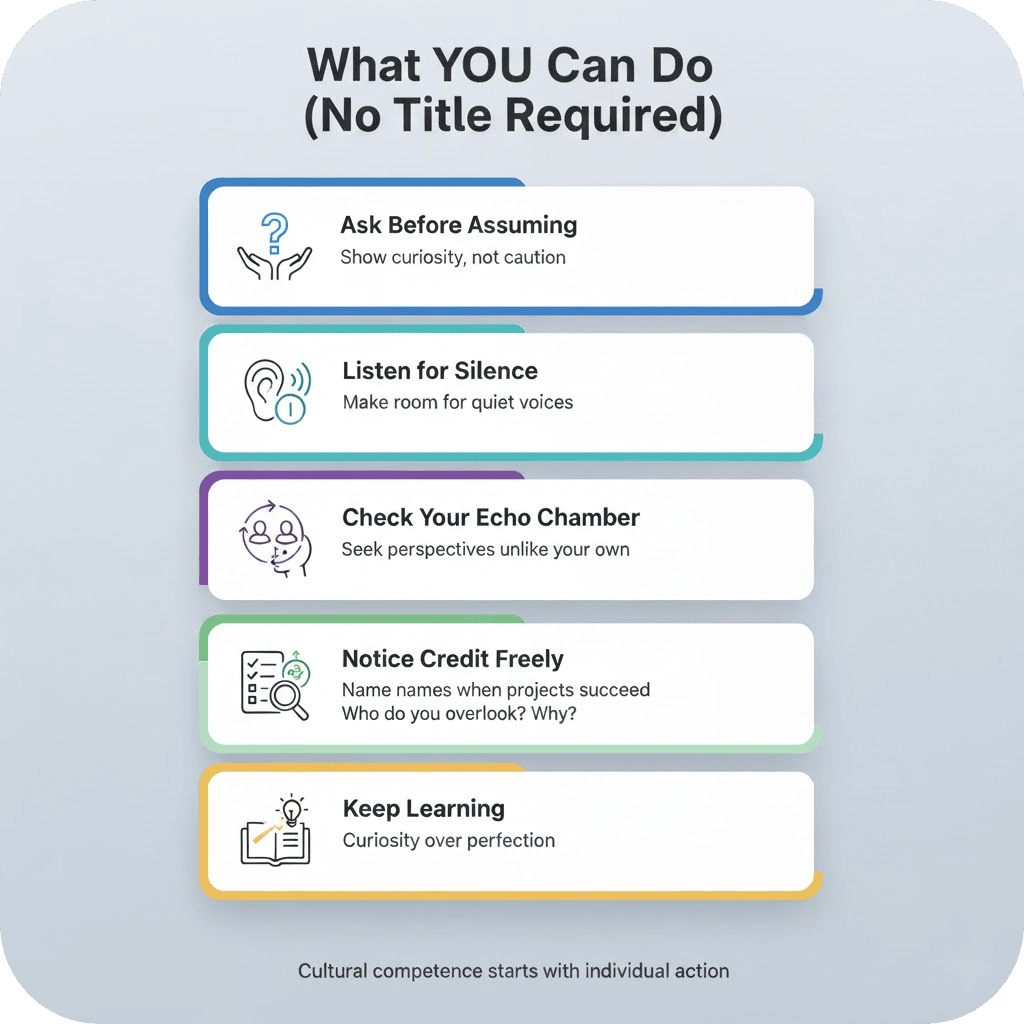
Ask Before Assuming
The simplest way to build respect is with a little curiosity.
If you don’t understand someone’s reference, pronunciation, or reaction, just ask; with care, not caution.
“Hey, I noticed you said it differently, how do you prefer it?” lands a lot better than guessing wrong or pretending you didn’t hear.
Employees remember when you take the time to ask them questions instead of assuming the answer. It comes across to your team: “You matter enough for me to get this right.”
Listen For What’s Not Said
Meetings tend to repeat themselves. Some people carry the conversation, others almost disappear into the background, and one person gets stuck writing everything down and never says a thing. Try breaking that pattern. If someone has been quiet the whole time, make a little bit of room for them. They might have something worth hearing. “I’d love to hear your take on this,” is simple enough, and super effective.
It is a small thing, that can be kind of easy to miss, but it helps more than any formal “inclusion” reminders ever do. Your people really notice when you make space for them. It changes how the room feels. Not dramatically, but enough that people start noticing each other again.
Even simple team building activities can reinforce these habits when they happen regularly.
Check Your Echo Chamber
Most of us end up gravitating toward other people like us or that sound like we do. It feels easier. Simpler. It just feels comfortable, almost so normal you do not even catch it until another person calls it out.
But that comfort zone can get small, fast.
Invite voices you don’t usually hear from. Try reading things that rub against your first reaction – (Allsides.com is a great source for doing this exact thing). Talking with someone who sees things totally differently can do more than you think. It ends up changing how you actually deal with people, little things here and there that you probably never planned on.
Handling Moments That Feel Weird
If something hits you wrong, say something if you can. Sometimes it’s just a joke or a little comment, and other times it’s a bigger call that seems strange.
Don’t make it loud or confrontational; a “hey, that didn’t sit right with me, can we talk,” works just fine. It usually cures more than you’d expect.
And if someone brings something like that to you, pause for a second. Try not to explain yourself right away. Listen first. They might be saying something you didn’t even catch. The point isn’t to “win” anything. You’re just figuring out what happened, so next time things go, even a little, smoother.
Share Credit Like It’s Free (Because It Is)
When a project goes well, name names. Mention who helped, who brainstormed, even who stayed late. Giving credit publicly builds trust privately.
And when your people see that kind of generous recognition coming from the top, they will start paying it forward too.
Recognition does not have to be tied to reviews or awards. It can happen in a group chat or as the meeting is closing out.
Pay Attention to Yourself
Individual cultural competence isn’t really just correcting everyone around you. Most of it is noticing what you tend to do without thinking about it:
- Who do you ask for help first?
- Whose feedback hits you hardest?
- Who do you maybe unconsciously overlook?
Catch those patterns early. They don’t make you wrong or anything… They just show you where you are.
What you do after noticing something… off; is the part that really matters the most.
Keep the Curiosity Going
You don’t cross something off a list and call it done.
Things keep shifting. Culture does. Language does. People bring in new stories and new expectations come up.
The only steady part is curiosity. Ask questions. Notice things. Learn things bit by bit as they come.
And if something feels new or odd, don’t step away from it. Lean in and see what it actually is. It isn’t about having perfect answers. It’s about being willing to learn as things change.
And when a bunch of people in the same workplace keep that mindset, the whole place stays alive and flexible instead of stuck in old habits.
What Still Gets in the Way
Even the best places hit weird moments around culture. And most of the time, it’s nothing huge or dramatic. They’re small moments:
The pause before someone decides whether they should even speak at all.
The topic that gets sidestepped in meetings.
The “we’ll handle that later” that never quite happens.
Those moments aren’t failures. They’re more like small signals that something needs attention. Because, once you notice them, you can pick out the patterns and figure out how to handle them with your team. If you do start seeing these patterns pile up, that can slip into classic toxic workplace territory long before anyone says it out loud.
Performative Everything
Some companies are better at looking inclusive than actually being inclusive.
They post statements, host awareness months, and update their website with every trending hashtag… But inside the walls, nothing feels different.
That sort of disconnect turns into cynicism pretty fast, and it spreads even faster.
Workers see it clearly when leaders post about inclusion but skip over the real issues like pay differences, promotions, and who keeps picking up the extra load. Fairness shows up in small decisions, and it shows up in pay too; some companies are even shifting toward skill based pay to close that gap.
The fix? Consistency. If you cannot follow through, it’s better not to say it at all.
The small things: fair hiring, giving credit evenly, letting policies actually flex for your people… Those are the steps that end up building more trust than anything else.
Fear of Being Wrong
People can mean well and still freeze up when the room gets tense. A lot of people will go quiet, worried they’ll say something off or upset someone or even look insensitive without trying to.
Sometimes, the fear of getting “canceled” even gets into their head.
When that happens, the whole place gets quiet in a strange way.
People start moving around more carefully, and the conversations that might actually help never really get going.
In places that handle this well, mistakes get treated as something you learn from instead of something you bury. If someone says something off, you talk through it calmly, clear the air, and keep moving.
That kind of reaction shows what accountability can look like without turning it into blame.
And it helps people stay involved instead of shutting down.
Avoidance from the Top
A lot of leaders believe silence equals neutrality. It doesn’t.
When something uncomfortable happens like bias, conflict, or unfair treatment, and the people at the top stay completely quiet, most employees take that as a sign to look away too.
It usually isn’t because leadership doesn’t care; a lot of the time they just don’t know how to handle it without making things worse or ending up in a mess of backlash.
But going silent almost always ends up costing more than the single awkward moment would have.
Even a short, straight-up acknowledgment like “We know this happened, and here’s what we’re doing about it,” goes further than a month of HR cleanup afterward.
Burnout and Bandwidth
Empathy doesn’t come very easy when the entire team is running on empty.
With everything changing and the hybrid shuffle going on for years; it adds up, and a lot of teams are, honestly, just tired.
And tired teams default to what’s easy… familiar circles, old patterns, minimal effort.
Cultural competence takes energy. But it also gives it back, if you make room for it.
Rotate responsibilities. Normalize rest. Let people recover so they can re-engage.
An overworked culture can’t become an inclusive one because it’s too busy simply surviving.
The “We’re Past That” Trap
Progress can become its own obstacle. Sometimes, a company gets a few awards or brings in a new diverse group or even updates some rules, and leadership starts thinking the job is somehow complete.
Inclusion and cultural competence aren’t one-and-done things. It needs regular care.
When you bring in new hires or move teams around or promote someone, you have to go back and steady the basics again.
Cultural competence isn’t about feeling bad. It’s about keeping the place running well.
And the second you stop tending to it, small issues can grow quickly.
From Barriers to Breakthroughs
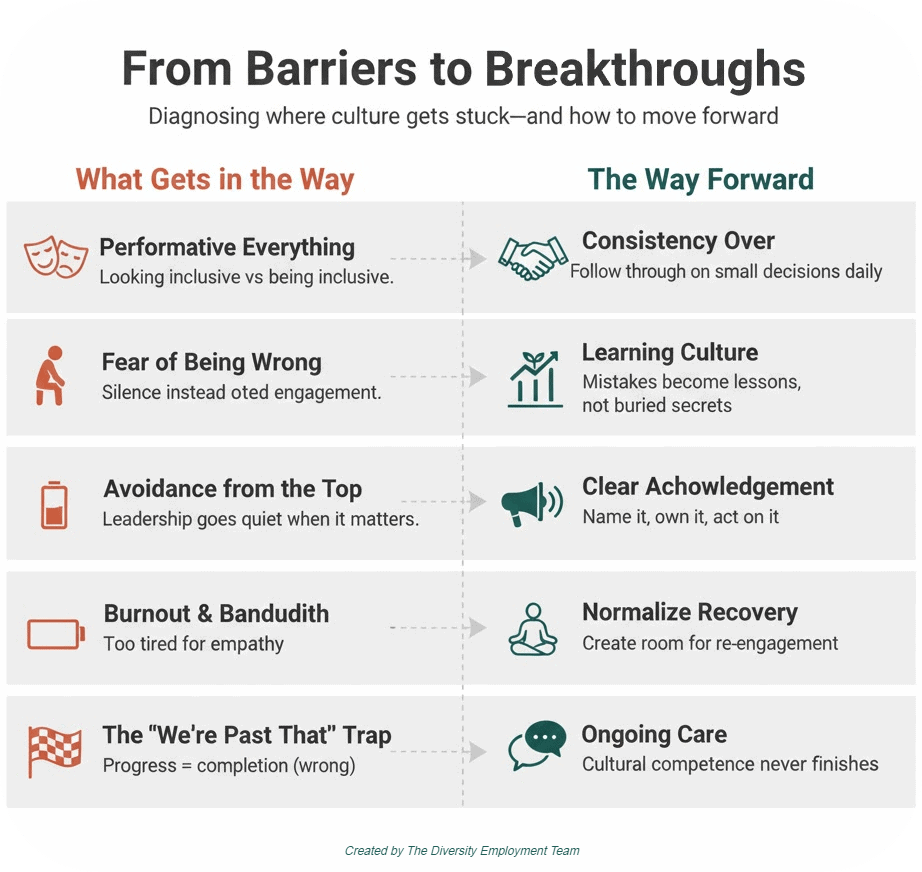
Every workplace hits walls.
What usually separates the teams that stay stuck from the ones that keep inching forward is whether they’re still open to learning or not.
Cultural competence really is just being open, especially when it would be easier to shut down.
Workplaces that practice cultural competence start to stand out to employees. They don’t just train their people; they learn from them.
Building a Workplace That Learns (Not Just Trains)
The companies that get this right have one thing in common: curiosity runs through everything they do.
These places don’t shove inclusion into a yearly training or let HR own the whole thing.
It shows up in the daily stuff: brainstorming, problem solving, picking new hires.
They know cultural competence isn’t something you “win.” It’s something the whole team keeps working to shape… together.
And every so often, things shift just enough that you’ll have to adjust again.
Keep the Conversation Going
Silence doesn’t teach anyone very much.
The teams that do this well talk openly on a regular basis, not only when they have to or when reviews come up.
They mention what worked, what didn’t, and what still needs fixing.
That openness does something subtle, it makes growth feel safe. Your people will stop bracing for corrections and start actively reaching for it.
Make Curiosity a Habit
Cultural competence thrives when curiosity is rewarded. That means encouraging questions, even the… clumsy ones.
It’s basically trading the “You should know that,” reaction for something more like “Glad you brought it up.”
Leaders who handle questions that way make curiosity feel safe.
Pretty soon, learning becomes something the whole team leans into instead of something they avoid.
Build Learning Loops, Not One-Offs
Most training dies in the calendar.
It happens once, everyone nods politely, and by next quarter, it’s gone.
Learning organizations keep the loop open.
They send quick reminders, share stories, rotate facilitators, and tie lessons to real projects.
It’s less “training session” and more “ongoing experiment.”
That mindset keeps everyone agile and keeps the culture alive instead of archived.
Measure What Matters (and Talk About It)
You can’t fix what you don’t track, but numbers without stories don’t move people either.
So yes, measure retention, representation, engagement. But also measure how people feel: safe, heard, respected.
When you share those results transparently, employees start to believe the process is real.
Connect Learning to Legacy
The most competent cultures continue to evolve and they take it step further by teaching the next generation how to keep it up.
They turn these lessons into mentorship.
They keep stories of progress and repair on hand so new hires can see what growth looks like in action.
That’s how competence becomes culture: when people stop saying “We should…” and start saying “We do.”
Bringing It All Together
If you’ve taken away one thing it should be that cultural competence doesn’t have a finish line… It is the way forward.
It’s how teams learn to stay connected while working at scale, how leaders turn intention into action, and how organizations become places people actually want to belong to.




